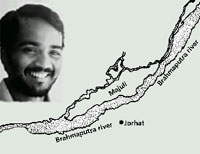Alive, but a hostage
 sanjoy Ghosh's abductors belonging to the United Liberation Front of Asom ( ulfa ), issued a statement on July 23 refuting the claims of an earlier statement (dated July 22) which said that he was dead. ulfa's central publicity secretary Mithinga Daimory stated that Ghosh was alive and in the custody of the front. The earlier press release was attributed by the Front to "some quarters who had no responsibility towards an issue pertaining to life and death".
sanjoy Ghosh's abductors belonging to the United Liberation Front of Asom ( ulfa ), issued a statement on July 23 refuting the claims of an earlier statement (dated July 22) which said that he was dead. ulfa's central publicity secretary Mithinga Daimory stated that Ghosh was alive and in the custody of the front. The earlier press release was attributed by the Front to "some quarters who had no responsibility towards an issue pertaining to life and death".
The moving spirit behind the erosion control project on Majuli island, in Assam's Jorhat district, Ghosh was picked up by the militants on the afternoon of July 4. He was accused of being an army informer, of being close to intelligence agencies like the Research and Analysis Wing.ulfa- which claims to fight against exploitation of the poor and natural wealth of the northeast - had threatened to 'try' Ghosh for his deeds. Appeals from Mother Teresa, Amnesty International and a host of other organisations and concerned citizens have fallen on deaf ears.
Ghosh is the general secretary of the Association of Voluntary Agencies for Rural Development-North-East ( avardne ), which began developmental work in Majuli almost one year back. It is a matter of pure coincidence that the army moved into the island at about the same time to stem insurgency. The ngo's presence on the island and the popularity it enjoys seems to have intimidated the outlawed outfit, which operates from several hideouts on the island. ulfa had issued several threats to avardne's workers and volunteers over the past year. But the organisation continued work undeterred.
avardne , coordinating the project to control erosion - on the world's largest riverine island, Majuli - had rallied the services of almost a dozen organisations and many locals to work out a solution to the problem. Majuli has shrunk by a third over the last 10 years. The problem is that the island's bank is almost perpendicular and the water flowing beneath cuts into it so that over time, a sort of overhang is formed which ultimately crashes into the river. What was being attempted was the use of natural forces to resist the river. The slope was pulled back and given an incline, and different varieties of local grasses and plants were grown on the sides. Debajit Baruah, teaching botany at Majuli college said, "Six of the best known local species have been selected. Any bank that has not been eroded has a thick cover of vegetation on it."
Sanjoy Ghosh, who had written about the project in an article for Down To Earth had hoped that "If this project succeeds, it would have saved some land on Majuli from extinction, but more importantly, it will become a symbol of the people's cooperation." His project has indeed shown promise and we sincerely hope that he is released safe and soon, to carry on the good work.
